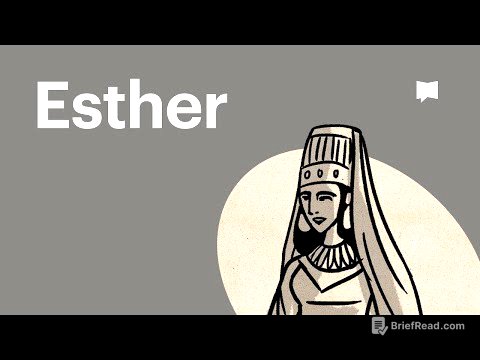TLDR;
The video discusses the concept of Baraka (blessings) in Islam, contrasting lawful (halal) income with interest-based (haram) earnings. It highlights that a smaller halal income can bring more contentment and well-being than a larger haram income, which often lacks Baraka and leads to various problems. The story of Abu Huraira is shared to illustrate how dedication to the Prophet Muhammad (peace be upon him) and reliance on Allah can lead to unexpected blessings and sustenance.
- Baraka is more important than the amount of income.
- Halal income brings contentment, while haram income lacks Baraka.
- Abu Huraira's story exemplifies reliance on Allah and dedication to the Prophet.
Importance of Baraka [0:00]
The speaker explains that Baraka is what Muslims mean when they say it's important in life. He contrasts someone earning a large salary from an interest-based bank (haram) with someone who leaves such a job for a smaller, halal income. Even though the halal income is significantly less, Allah puts more Baraka in it. This Baraka manifests as things lasting longer, fewer health issues for the family, and an overall sense of happiness and tranquility. On the other hand, a large haram income lacks Baraka, leading to insufficiency, frequent illnesses, accidents, and a lack of happiness. Baraka is attained by following the Quran, the Sunnah (teachings and practices of the Prophet), and seeking halal sustenance.
Abu Huraira's Example [1:18]
The speaker shares the story of Abu Huraira, who narrated a vast number of hadith (sayings and actions of the Prophet) despite only being with the Prophet Muhammad (peace be upon him) for four years. The reason was that Abu Huraira dedicated his time entirely to being with the Prophet, whereas other companions had to focus on farming, trade, and family responsibilities. Abu Huraira recounts instances of extreme hunger and how he would subtly hint at his hunger to Abu Bakr and Omar, hoping they would offer him food.
The Glass of Milk [2:23]
The speaker narrates an incident where the Prophet Muhammad (peace be upon him) found Abu Huraira lying in the masjid, appearing to be near death from hunger. The Prophet took him home and asked his wives if there was any food. They only had a single glass of milk, gifted by neighbors. The Prophet then instructed Abu Huraira to call the "people of Suffa" – a group of around 80 impoverished individuals who lived in the masjid – to come and drink from the milk.
The Miracle of Sufficiency [3:38]
The Prophet Muhammad (peace be upon him) instructed Abu Huraira to invite the people of Suffa in groups of ten. Each group came, drank their fill from the single glass of milk, and left satisfied. After all 80+ people had drunk, the Prophet then asked Abu Huraira to drink. Citing an authentic hadith, the speaker explains that the host is the last to drink. Abu Huraira drank, and the Prophet kept urging him to drink more until Abu Huraira was completely full, stating that he could not consume any more except for breath. The speaker emphasizes that this is an example of Baraka, where a single glass of milk sufficed for so many people.









